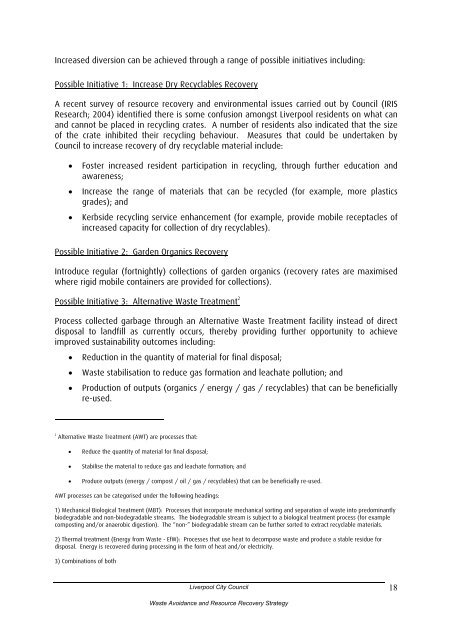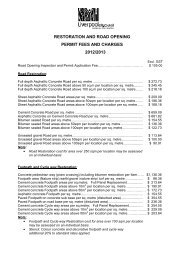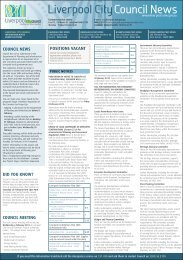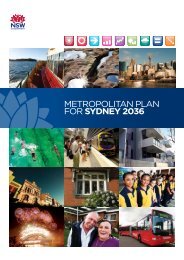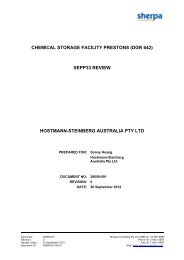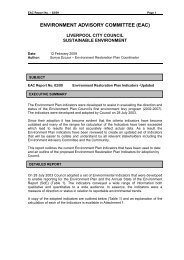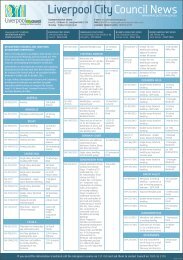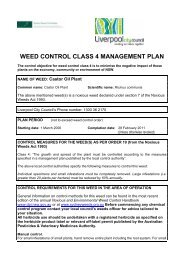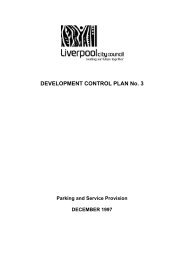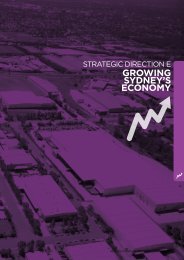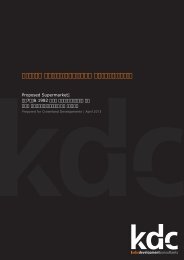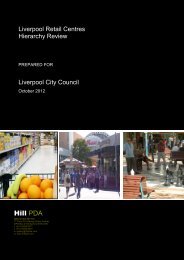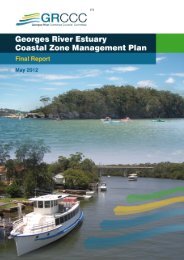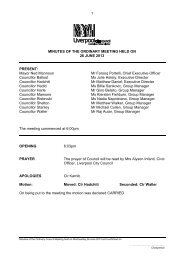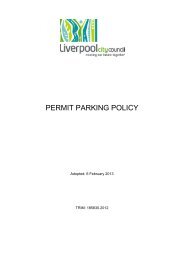to view the WARR Strategy. - Liverpool City Council - NSW ...
to view the WARR Strategy. - Liverpool City Council - NSW ...
to view the WARR Strategy. - Liverpool City Council - NSW ...
You also want an ePaper? Increase the reach of your titles
YUMPU automatically turns print PDFs into web optimized ePapers that Google loves.
Increased diversion can be achieved through a range of possible initiatives including:Possible Initiative 1: Increase Dry Recyclables RecoveryA recent survey of resource recovery and environmental issues carried out by <strong>Council</strong> (IRISResearch; 2004) identified <strong>the</strong>re is some confusion amongst <strong>Liverpool</strong> residents on what canand cannot be placed in recycling crates. A number of residents also indicated that <strong>the</strong> sizeof <strong>the</strong> crate inhibited <strong>the</strong>ir recycling behaviour. Measures that could be undertaken by<strong>Council</strong> <strong>to</strong> increase recovery of dry recyclable material include:• Foster increased resident participation in recycling, through fur<strong>the</strong>r education andawareness;• Increase <strong>the</strong> range of materials that can be recycled (for example, more plasticsgrades); and• Kerbside recycling service enhancement (for example, provide mobile receptacles ofincreased capacity for collection of dry recyclables).Possible Initiative 2: Garden Organics RecoveryIntroduce regular (fortnightly) collections of garden organics (recovery rates are maximisedwhere rigid mobile containers are provided for collections).Possible Initiative 3: Alternative Waste Treatment 2Process collected garbage through an Alternative Waste Treatment facility instead of directdisposal <strong>to</strong> landfill as currently occurs, <strong>the</strong>reby providing fur<strong>the</strong>r opportunity <strong>to</strong> achieveimproved sustainability outcomes including:• Reduction in <strong>the</strong> quantity of material for final disposal;• Waste stabilisation <strong>to</strong> reduce gas formation and leachate pollution; and• Production of outputs (organics / energy / gas / recyclables) that can be beneficiallyre-used.2Alternative Waste Treatment (AWT) are processes that:• Reduce <strong>the</strong> quantity of material for final disposal;• Stabilise <strong>the</strong> material <strong>to</strong> reduce gas and leachate formation; and• Produce outputs (energy / compost / oil / gas / recyclables) that can be beneficially re-used.AWT processes can be categorised under <strong>the</strong> following headings:1) Mechanical Biological Treatment (MBT): Processes that incorporate mechanical sorting and separation of waste in<strong>to</strong> predominantlybiodegradable and non-biodegradable streams. The biodegradable stream is subject <strong>to</strong> a biological treatment process (for examplecomposting and/or anaerobic digestion). The “non-” biodegradable stream can be fur<strong>the</strong>r sorted <strong>to</strong> extract recyclable materials.2) Thermal treatment (Energy from Waste - EfW): Processes that use heat <strong>to</strong> decompose waste and produce a stable residue fordisposal. Energy is recovered during processing in <strong>the</strong> form of heat and/or electricity.3) Combinations of both<strong>Liverpool</strong> <strong>City</strong> <strong>Council</strong>18Waste Avoidance and Resource Recovery <strong>Strategy</strong>


